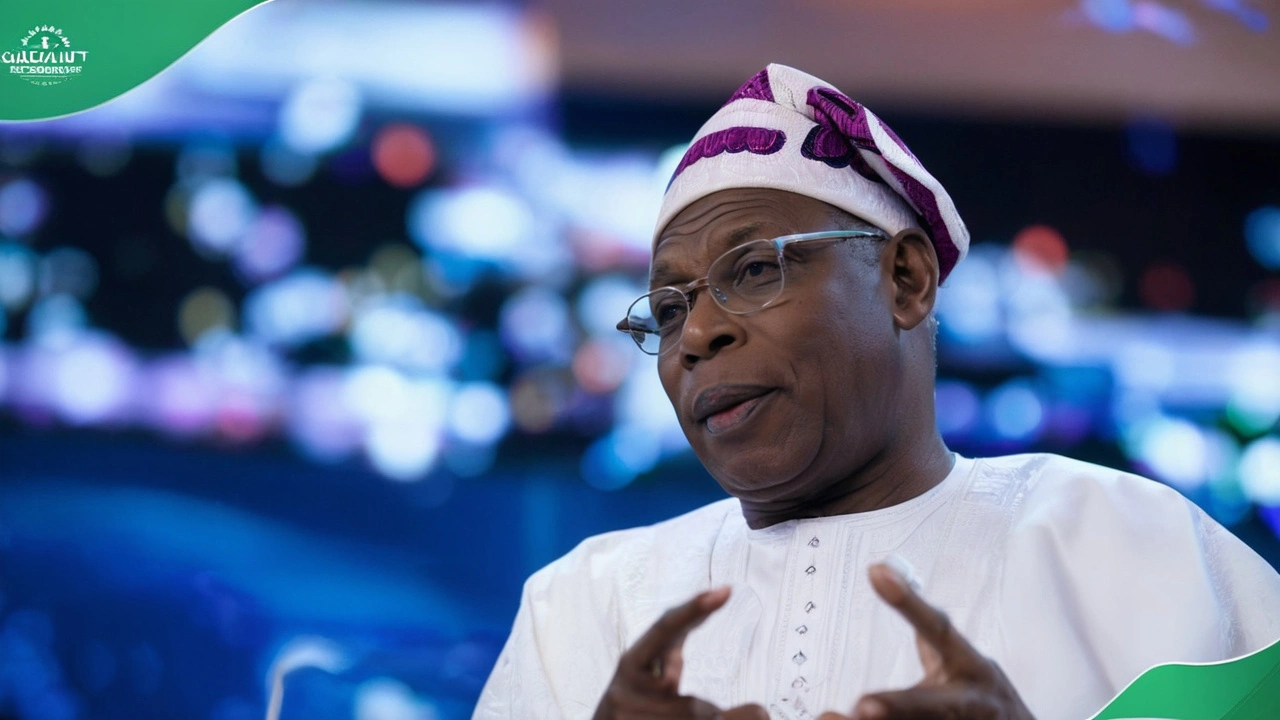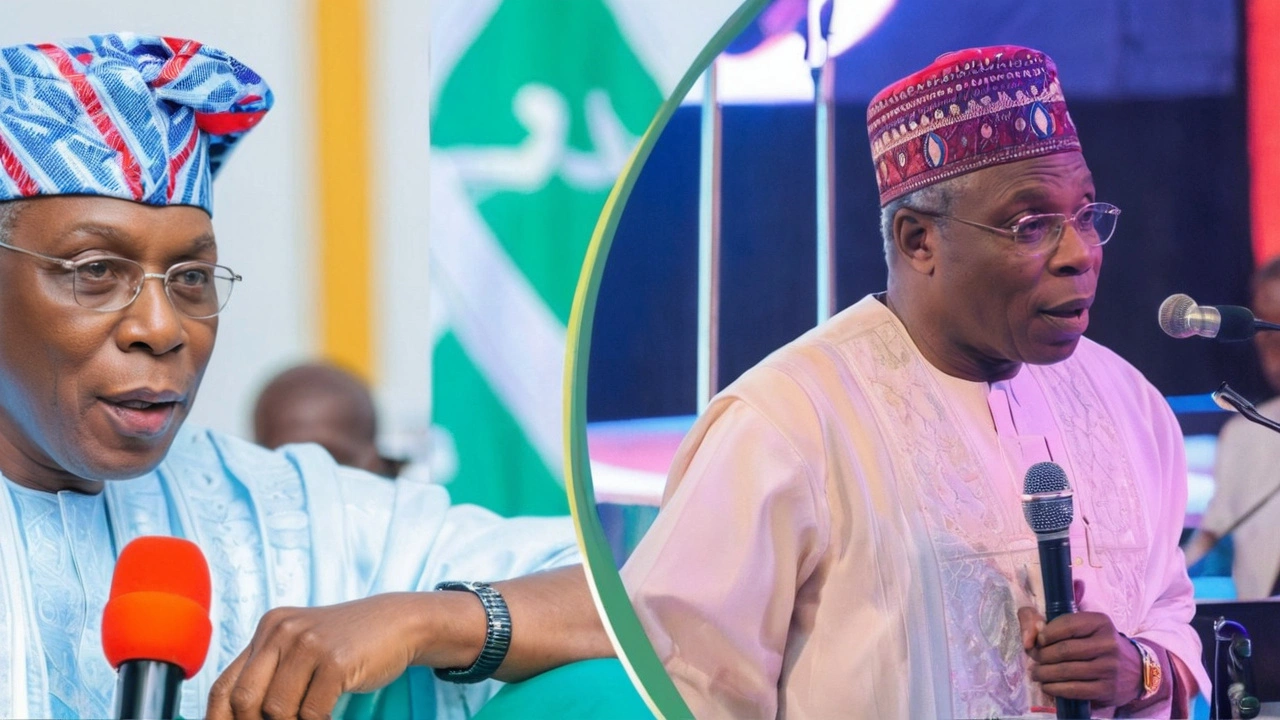Olusegun Obasanjo Calls for Political Reform
In a recent statement, former Nigerian President Olusegun Obasanjo made a significant proposal aimed at reshaping the country's political landscape. Emphasizing the urgency of political reform, Obasanjo advocated for a six-year single term for the presidency. This, he argues, would reduce the intense political competition and infighting that often accompany elections in Nigeria. He believes that a prolonged single term would allow presidents to focus more on governance rather than perpetual campaigning, thereby stabilizing Nigeria's turbulent political environment.
Obasanjo's comments resonate deeply within the context of Nigeria’s current challenges. The nation is grappling with issues like corruption, ineffective governance, and political instability. By proposing a single six-year presidential term, he suggests a strategic change that could potentially mitigate these problems. His call was not just administrative but also pointedly critical, as he named specific leaders he believes are guilty of corrupt practices and should face legal consequences.
Critique of Current Leadership
During his address, Obasanjo openly criticized certain Nigerian leaders, alleging that their actions warranted imprisonment. This bold stance is typical of Obasanjo, who has never shied away from speaking against what he perceives as injustice and maladministration. His identification of individuals he deems unfit for leadership due to corrupt practices is a clarion call for accountability in Nigerian politics.
Obasanjo’s outspoken views on corruption and governance are well-known. Throughout his career, he has positioned himself as a reformer and a staunch advocate for integrity in public office. His recent remarks align with his historical efforts to identify and challenge systemic corruption and promote ethical leadership. Obasanjo's critique extends beyond personal condemnation; it underscores a broader concern about the state of Nigerian leadership and governance.
Nigeria has a long history of political corruption, with numerous cases emerging across different administrations. By calling out current leaders, Obasanjo reinforces the necessity of addressing these ongoing issues. His candidness serves as both a warning and an inspiration to future leaders about the consequences of malpractice and the importance of maintaining ethical standards in governance.
Addressing Governance Issues
Obasanjo's recommendations are not limited to criticizing the current leadership; they also include structural changes aimed at improving governance in Nigeria. The proposal for a six-year single presidential term is part of his broader vision for political stability. Such a term would theoretically give presidents sufficient time to implement long-term policies without the distraction of re-election campaigns. This would, in turn, allow for more effective governance and better policy continuity.
According to Obasanjo, the recurring cycle of elections every four years leads to short-term thinking and disrupts the continuity necessary for substantial progress. Leaders become preoccupied with winning elections, often at the expense of genuine governance. A six-year term could provide a more conducive environment for strategic planning and execution of developmental policies.
Promoting Accountability
Another critical aspect of Obasanjo's proposal is the emphasis on accountability. By pointing fingers at corrupt leaders, he highlights the pressing need for transparency and integrity in Nigerian politics. Corruption has been a persistent bane in Nigeria, affecting various sectors including the economy, judiciary, and public services. Obasanjo’s call for imprisonment of corrupt leaders is a stern reminder of the need for a rigorous crackdown on corruption.
Accountability in governance is not just about punishing the corrupt; it also involves creating systems and institutions that prevent corruption from taking root. Obasanjo's vision includes reforming such systems to ensure they are robust enough to deter unethical practices. This would require significant changes, including legal reforms, strengthening of anti-corruption agencies, and promoting a culture of transparency.
Obasanjo’s proposal is a call to action for both current and future leaders. It is an appeal to prioritize the nation's long-term stability and prosperity over short-term political gains. His vision for a single six-year term plays into the broader narrative of creating a more stable and accountable governance structure in Nigeria.
Historical Context and Legacy
Obasanjo’s advocacy for political reform is deeply rooted in his own political legacy. As a two-term president, he has firsthand experience with the country's political dynamics and challenges. His tenure was marked by significant efforts to combat corruption, improve governance, and promote stability. Despite facing criticism and controversy, Obasanjo has consistently maintained his stance on the need for political and structural reforms.
His latest proposal is a continuation of his lifelong commitment to improving Nigerian politics. It reflects his understanding of the systemic issues that plague the country's governance and his belief in strong, principled leadership. By advocating for a six-year single presidential term, Obasanjo aims to address some of the root causes of political instability and corruption.
Obasanjo's legacy is one of proactive engagement with issues of national importance. He remains a prominent figure in Nigerian politics, leveraging his experience and influence to drive conversations around necessary reforms. His recent comments are part of this ongoing effort to promote better governance and accountability.
The Road Ahead
The implementation of Obasanjo’s proposed reforms would require significant political will and collaboration among Nigeria's political class. Changing the presidential term structure would necessitate constitutional amendments, which in turn would require broad consensus among lawmakers. This is no small feat in a country with diverse political interests and deeply entrenched power structures.
However, Obasanjo’s proposal has sparked an important dialogue about the future of governance in Nigeria. It challenges leaders to rethink the current political framework and consider long-term reforms that could benefit the country. The discourse around political terms and accountability is crucial for Nigeria’s democratic development.
Regardless of whether his specific recommendations are adopted, Obasanjo’s broader message about the need for political and ethical reform is clear. It underscores a vision for a Nigeria where leadership is characterized by integrity, transparency, and a commitment to national development. His advocacy serves as a reminder that genuine progress requires unwavering dedication to these principles.

Conclusion
Olusegun Obasanjo’s recent call for a six-year single presidential term is both a critique of the current political climate in Nigeria and a visionary proposal for the future. By advocating for this change, he aims to reduce political tensions and provide a more stable governance structure. His outspoken criticism of corrupt leaders also highlights the urgent need for accountability in Nigerian politics.
As Nigeria continues to navigate its complex political landscape, Obasanjo’s insights offer a valuable perspective on how to address some of its most persistent challenges. His vision of a more stable and transparent governance framework could serve as a roadmap for future reforms, fostering a political environment where ethical leadership and effective governance are the norms rather than the exceptions.






J T
August 10, 2024 AT 19:18Look, six years sounds fine until you realize it just gives one guy more time to line his pockets 😒
A Lina
August 14, 2024 AT 02:48While the layman perceives a prolonged tenure as an avenue for graft, the systemic analysis indicates that a six‑year single term could, paradoxically, enhance institutional integrity by attenuating electoral cyclicity. The reduction of perpetual campaign rhetoric may permit a more sustained policy horizon, mitigating the phenomenon of policy myopia. Nevertheless, the prescription fails to address the endemic patronage networks that pervade the executive apparatus. In essence, the temporal extension is a superficial amendment lacking substantive structural overhaul.
Virginia Balseiro
August 17, 2024 AT 10:18Whoa! This could be the game‑changer Nigeria desperately needs! Imagine a president with a genuine runway to implement bold reforms without the constant election circus 🚀
It’s about time we break the shackles of short‑termism and let leadership breathe!
Jared Mulconry
August 20, 2024 AT 17:48It’s worth contemplating that changing term length alone won’t solve deep‑rooted governance issues. A holistic approach, including electoral reforms and civil society empowerment, might be more effective.
Brandon Rosso
August 24, 2024 AT 01:18Esteemed colleagues, I posit that the adoption of a six‑year single term, accompanied by robust checks and balances, could engender a climate of sustained development. Optimistically, such a framework would afford the incumbent administration the temporal latitude to enact comprehensive infrastructural projects, thereby catalyzing economic growth. Let us therefore advocate for constitutional deliberation with measured optimism.
Tracee Dunblazier
August 27, 2024 AT 08:48While the optimism is commendable, the reality remains that without stringent accountability mechanisms, extending tenure may simply consolidate power. A mere extension, absent transparent oversight, risks perpetuating the very maladies we aim to eradicate.
Edward Garza
August 30, 2024 AT 16:18Another political gimmick; they’ll just patch the constitution and keep doing the same corrupt routine.
Allen Rodi
September 2, 2024 AT 23:48For anyone curious, the amendment process in Nigeria requires a two‑thirds majority in both legislative chambers, plus a national referendum. It’s a high bar, but not impossible if there’s genuine public pressure.
Jody Webster
September 6, 2024 AT 07:18Wait…; why are we even talkng about term lengths??; the real problem is the endless bribery!!!; maybe we shuld focus on voting integrity??
Steve Goodger
September 9, 2024 AT 14:48Friends, let us consider the broader tapestry of Nigeria’s political evolution before leaping to a singular solution. Historically, the nation has oscillated between military rule and fragile democratic experiments, each leaving an indelible imprint on civic expectations. The proposal for a six‑year single term emerges from a legitimate desire to curtail incessant campaigning, yet it does not exist in a vacuum. One must examine how such a change would interact with existing institutions, including the National Assembly, the judiciary, and the myriad of quasi‑governmental agencies that currently wield considerable influence. Moreover, the cultural dimension-where regional affiliations and ethno‑religious identities shape voting behavior-cannot be dismissed. Extending the presidential tenure may, paradoxically, exacerbate feelings of marginalization if minority groups perceive a prolonged exclusion from the executive’s attention. Conversely, a longer term could provide the stability necessary to implement long‑term agricultural reforms, which have been hampered by short‑term policy shifts. It also offers the potential to strengthen foreign investment confidence, as investors often seek policy predictability. Nonetheless, the mere alteration of term length must be accompanied by rigorous anti‑corruption reforms, transparent budgeting processes, and the empowerment of civil society watchdogs. In practical terms, the constitutional amendment would require a two‑thirds majority in both houses of the National Assembly, followed by a nationwide referendum-a process that demands extensive public education and engagement. Thus, the onus is on political leaders to articulate a clear, inclusive roadmap that outlines how a six‑year term integrates with broader governance reforms. In closing, while the six‑year proposal holds promise, it should be viewed as one component of a comprehensive strategy aimed at fostering durable democracy, economic resilience, and social cohesion across the nation.
johnson ndiritu
September 12, 2024 AT 22:18Honestly, this utopian spiel is a distraction from the fact that the same elite will just tighten their grip 🤦♂️. No amount of fancy language will change the reality of patronage and vote‑buying. If anything, a longer term is a gift to the corrupt.
sheri macbeth
September 16, 2024 AT 05:48Oh sure, because a six‑year term is exactly what the secret cabal behind the scenes has been crying for. 🙃 Let’s just hand them a longer lease on power and see what miracles happen.
Sameer Kumar
September 19, 2024 AT 13:18Time, when stretched, can either be a river that carves canyons of progress or a stagnant pool where decay settles. A longer presidential term is a double‑edged sword; it may nurture deep reforms or entrench inertia. The key lies not in duration but in the moral compass of those who wield it.
Lane Herron
September 22, 2024 AT 20:48Behold the grandiose notion of elongating executive tenure-a veritable panacea for Nigeria’s multifaceted malaise, as if term limits were the sole pathogen afflicting the polity. Yet this sophistic argument neglects the intricate lattice of institutional decay that pervades the federation. One must eschew such reductionist panaceas in favor of a polycentric reform architecture.
Lois Parker
September 26, 2024 AT 04:18Sounds like another empty promise.
Lerato Mamaila
September 29, 2024 AT 11:48Let’s engage diverse voices-from grassroots activists to seasoned scholars-to craft a constitutional amendment that truly reflects Nigeria’s pluralistic aspirations; collaboration is the cornerstone of sustainable reform.